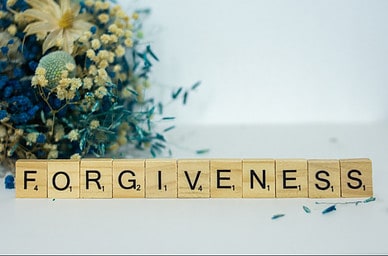What Is The Meaning Of Forgiveness?- It’s A Process

Certainly, there are some misconceptions surrounding forgiveness. Some individuals mistakenly think that forgiving someone implies condoning their actions, while others fear that forgiveness might enable a repeat of the same behavior or be seen as making excuses for the wrongdoer. However, I’d like to clarify the true essence of forgiveness and its meaning. So, in this article, I will go into greater detail about the process and how it can lead to a more loving, compassionate, and understanding life. It’s also why it’s such a good way to learn how to live.

The Significance Of Forgiveness
So, I suppose it’s important to first define forgiveness and why it’s important for personal development. Before we get into the specifics of moving in the right direction in terms of forgiveness and self-love.
Forgiveness is defined as the ability to not hold something against someone, regardless of what they have done to you. Without delving into intricate details, this has fostered a profound belief in the importance of resilience, releasing the past, and progressing forward.
In the 18th century, forgiveness, empathy, and love were regarded as abstract mental concepts. However, today we understand that these concepts are rooted in the dorsolateral prefrontal cortex, alongside cognition and emotions within the brain.
Numerous neurons within the dorsolateral prefrontal cortex communicate through electrical signals. When they establish connections, they relay a message to the brain, influencing one’s capacity for forgiveness. Essentially, it’s your brain that plays a role in determining your forgiveness disposition.
In addition to pardoning others for their actions towards someone else, forgiveness also entails forgiving oneself. The capacity for genuine forgiveness thus hinges on love and self-awareness at every level. Despite its challenges, a genuinely forgiving individual often extends forgiveness because it aligns with their sense of morality and integrity.
Consequently, forgiveness can be seen as a way to recognize the imperfections inherent in everyone. This acknowledgment stems from the understanding that we all occasionally err and cause harm to others. When we grasp this reality, it enables us to progress and move forward.

The Right Direction Is Moving Forward
The initial stride toward becoming a more forgiving, compassionate, and nurturing individual involves comprehending the essence of forgiveness and actively striving to cultivate profound understanding.
Being able to forgive equates to freedom and a happier life.
By focusing on becoming more forgiving and reducing tendencies toward vengeance, you can expect overall enhancements in both your health and lifestyle.
To start, how frequently do you catch yourself harboring negative thoughts about someone? This behavior is commonly referred to as vengefulness or bearing grudges, and it can vary based on factors such as self-esteem, inadequate coping abilities, temperament, and susceptibility to embarrassment or emotional hurt. You can increase your chances of being a forgiving person by becoming more self-aware. One method is to look for the good in everything.
Individuals grappling with forgiveness share common struggles. It is entirely feasible to enhance self-awareness and self-love. As someone inherently inclined toward forgiveness, I’ve discovered that seeking positivity in all situations aids in fostering a forgiving disposition. These are some of the initial motivations for assisting people who are not self-aware.

It’s About Letting Go
I’m acquainted with numerous individuals who experimented with diverse strategies to attain forgiveness and self-love before finding the right path. These methods include increasing self-awareness, cultivating greater understanding, assuming responsibility, practicing visualization, extending kindness to oneself and others, mastering the art of giving, refraining from taking offense, reducing judgment, embracing an open-minded approach, and embracing a present-focused mindset instead of dwelling on the past.
Upon my initial encounter with the concept of using forgiveness as a means to embrace love, I grasped that it primarily involves progressing forward instead of lingering in the past. This process is commonly referred to as “letting go,” and it’s a step we all must take at various points in our lives if we aspire to move forward and act in accordance with what’s right. Achieving genuine release can span anywhere from six weeks to an indefinite period.
When we lack comprehension of the essence of forgiveness and the ability to identify love and compassion in our lives, we inadvertently empower negative beliefs and past experiences to dominate us. This can manifest as feelings of hatred, deteriorating mental well-being, or lingering resentment. Such emotions can trap us in a perpetual cycle of sorrow, an insatiable desire for retribution, and the potential development of various mental disorders driven by vengeful impulses.
Ultimately, the process boils down to taking small, gradual steps and cultivating a more open-minded perspective. However, this doesn’t imply immunity from being hurt or experiencing negative feelings towards others. The essential element is recognizing those who have caused you pain and being willing to engage in conversations about your concerns, facilitating the path toward moving forward.
The Understanding You Don’t Have to Forgive and Forget
A common misconception is that forgiving someone necessitates forgetting what transpired, but this is far from the truth. Nevertheless, it can indeed be challenging to extend forgiveness and make progress if you find yourself trapped in the past.
A lot of individuals push aside their emotions or attempt to suppress the memories, thinking that it’s preferable to act as though the event never occurred and put on a facade of normalcy, even though beneath the surface, they harbor resentment and anger.
In actuality, genuine emotions will inevitably surface, and sooner or later, they will be projected onto those in your vicinity. When one tries to forget what has happened, it causes stress on the body. Causing more harm than good.
Although it might appear tempting to disregard past events and proceed, this isn’t a healthy approach to life or forgiveness. The underlying reason is that genuine forgiveness requires confronting the issue directly.
The optimal course of action involves engaging in a conversation with the individual who caused you harm and attempting to find a resolution. This can be exceptionally challenging, especially if the harm inflicted was severe.

Forgiving someone doesn’t imply erasing the past; rather, it signifies acknowledging it and being prepared to move forward.
The Steps to Forgiveness
Forgiveness is a gradual process that doesn’t occur suddenly. It involves numerous stages, which you can adapt to suit your specific circumstances. Nevertheless, I encourage you to persist in taking these steps towards attaining a more improved and healthier life.
Step 1: Recognize: Recognizing your pain is crucial. You can achieve this by identifying the origin of the pain and the individuals involved. Additionally, it’s essential to acknowledge the timeframe and circumstances surrounding the situation.
Step 2: Consider: Before embarking on the forgiveness journey, it’s essential to reflect on what motivates you to forgive. This involves the capacity to contemplate the issues at hand before taking action. So, in that regard, contemplate your emotions and recognize how forgiving someone can actually bolster your resilience and inner strength.
Step 3: Coming To Terms: Acknowledging that the past is unchangeable is a vital step. Regardless of how strongly you desire to alter history, it’s time to embrace the fact that harboring anger toward those who have hurt you serves no purpose.
“Acceptance may pose challenges, yet it remains an essential element of the forgiveness process.”
Step 4: Determine: The choice to forgive ultimately rests with you. However, holding onto a grudge is counterproductive and harmful. Therefore, you must decide whether to initiate the forgiveness process or conclude it. This decision is crucial as it will shape your future relationship with this person.
Step 5: Fix: Now is the moment to embark on the journey of repairing your relationship with the individual or individuals who have caused you harm. However, before you can do that, you must first reconstruct what was broken. Be mindful that this process will require time and patience. If the other person is unwilling to engage in the rebuilding process, consider moving forward independently.
Step 6: Learn: Now, you have the chance to delve into the study and deepen your understanding of what forgiveness truly involves. It’s essential to bear in mind that forgiveness is a two-way process, involving both parties. When you grasp this concept, you’re on the right path toward forgiveness.
Step 7: Forgive: The moment for forgiveness has arrived. You can choose to do this discreetly or openly. Regardless of your approach, it’s important not to anticipate a specific response from the other party. Ultimately, it comes down to doing what you believe is the right course of action.
It’s vital to bear in mind that forgiveness is a gradual process and should not be rushed. Take your time and make decisions based on what you genuinely believe will facilitate your healing and progress. By doing so, you can rest assured that everything you’ve endured will ultimately contribute to your inner strength and growth.
In Conclusion
In summary, forgiveness entails acknowledging past actions and progressing forward, leading to improved health and a heightened enthusiasm for life. It signifies a deep understanding of your self-worth and standing. Nevertheless, forgiving someone doesn’t necessitate forgetting or denying what transpired. Ultimately, it boils down to comprehending the source of hurt and recognizing that forgiveness is a means to let go and move forward.
Now, it’s your opportunity to extend forgiveness to someone you may have overlooked in the past. Nevertheless, it’s important to remember that not everyone merits forgiveness.
Feel free to drop a comment if you have any inquiries regarding the concept of forgiveness. I possess ample experience in this area and would be more than happy to offer my assistance.
I also recommended reading my article “How To Be More Understanding?” It’s a great read.
Related: Learning How to Love Yourself
The Negative Effects of Holding a Grudge- Doesn’t Serve You
Kiersti writes on self-love and personal development professionally. Over the past ten or so years, she has studied self-love and personal growth. Visit https://womansdailyneeds.com/ to learn more about what she does, and like her on Facebook at https://facebook.com/womansdailyneeds to keep up with her.


6 Responses
Hello! Thank you so much for sharing the meaning of forgiveness!
I think forgiveness is very important, not just for the person who may have done something wrong, or for yourself as well… and vice versa!
I totally agree with you, it’s about letting go! If you keep all that extra weight on your shoulders, it’ll weigh you down.
Once you let it go, you are more free and you guys can finally move on!
You’re so welcome. Thanks so much for reading it.
Forgiveness is important for both the person who is forgiving and the person who is being forgiven. For the person who is forgiving, it can help to release negative emotions and improve mental health. For the person who is being forgiven, it can help to improve relationships and reduce stress.
Overall, forgiveness is a complex concept with many different interpretations. But at its core, forgiveness is about healing and moving on from hurt. It is an important part of our lives and can have a profound impact on our well-being.
Being a Christian I always forgive and move on and this article proves to be of great wisdom and education to those who struggle to forgive. Great article.
Exactly and very wide words spoken there.
Thanks for sharing your expertise. I highly appreciate it.
Excelt post, Kiersti. I enjoyed reading this and learned about the true meaning of forgiveness. I like this quote from this article – “Being able to forgive equates to freedom and happier life”. It’s about letting it go and loving how you explained it. Thank you for writing it; it made me think and reevaluate many things. Have a great day. Regards. Vlad
Well, thank you. I am so glad you enjoyed reading it.